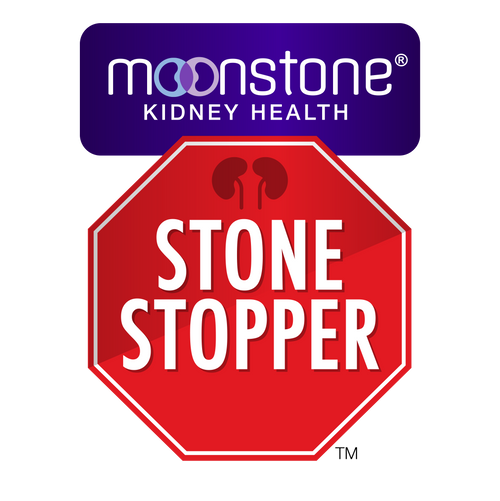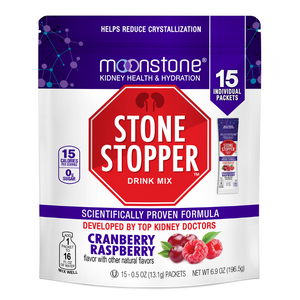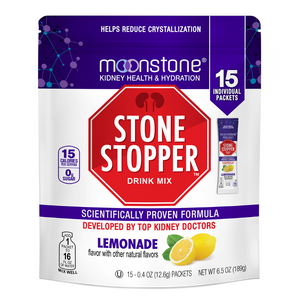Congratulations on your breastfeeding journey! Motherhood brings immense joy but can also present unexpected health challenges especially right after pregnancy. This blog post will help you understand how to nurture your body as a breastfeeding mama, while having painful kidney stones. (And how to prevent kidney stones using alkali citrate!)
If you're a nursing mom dealing with kidney stones, it's essential to prioritize your well-being while ensuring the best for your little one. Read on to explore the connection between breastfeeding and kidney stones. We share valuable information, and provide practical tips to help you navigate this unique situation with the help of Moonstone Nutrition — A perfect solution for simplifying kidney care.
Now, let’s dive in and learn how to best manage kidney stones while breastfeeding!
What are Kidney Stones?
Kidney stones are troublesome mineral and salt deposits that form in the kidneys and can cause significant discomfort. The most common types are "calcium oxalate" and "calcium phosphate" stones. These formations can vary in size and shape, and they have the potential to disrupt your breastfeeding routine.
Did we already mention significant discomfort? Ouch.
The good news is that with proper management, you can continue breastfeeding your baby while taking care of your health.

The Connection between Kidney Stones and Breastfeeding:
While kidney stones themselves do not directly affect breastfeeding, certain aspects related to their treatment and prevention may require additional attention for nursing moms. Here are a few key points to consider
1. Hydration: Your Best Friend
Staying hydrated is vital for both breastfeeding and kidney stone prevention. Drinking plenty of water helps maintain an adequate flow of breast milk while also reducing the risk of stone formation. Aim to consume at least 8-10 glasses of water daily. Remember to carry a water bottle with you, as breastfeeding can make you feel thirsty more often.
Discover convenient and delicious products that support kidney health and hydration in the Moonstone Shop.
2. Kidney Stone Medication and Breastfeeding
If your doctor prescribes medication to manage or dissolve kidney stones, it's essential to discuss your breastfeeding status. Some medications can pass into breast milk and potentially affect your baby.
Consult your healthcare provider to ensure the safety of specific medications while breastfeeding. They will guide you with suitable options that consider both your health and your little one's well-being.

3. Dietary Adjustments for Kidney Stone Prevention
Proper nutrition plays a vital role in preventing kidney stone formation. While dietary adjustments are generally safe for breastfeeding mothers, it's best to seek guidance from a registered dietitian or healthcare provider. They can tailor recommendations that meet your nutritional needs while reducing the risk of kidney stones.
Citric acid, found in fruits like lemons and oranges, can help inhibit the formation of certain types of kidney stones by increasing urine citrate levels, which in turn inhibits stone formation. Including citric acid-rich foods in your diet may be a natural and tasty way to reduce the risk of kidney stone formation.
4. The Role of Calcium
Contrary to popular belief, increasing calcium intake can actually help prevent certain types of kidney stones. Adequate dietary calcium binds with oxalate, a substance that contributes to stone formation, preventing its absorption by the body.
Calcium supplements are also not only safe, they are helpful as well. Yale Medicine Urologist, Dr. Piruz Motamedinia states that “One of the most common misconceptions is because most kidney stones are calcium, that dietary calcium supplements are a risk factor for kidney stones, that is actually contrary to the evidence”
Other good sources of dietary calcium include low-fat dairy products, leafy green vegetables, and fortified foods.
5. Seeking Professional Guidance
If you experience symptoms such as severe pain, blood in urine, or persistent urinary tract infections, it's crucial to consult your healthcare provider promptly. They can diagnose kidney stones accurately and provide appropriate guidance and treatment options, taking into account your breastfeeding status.

Moonstone can help you feel more comfortable during this important time:
Prevention of kidney stones is key and Moonstone is there to help guide your body, with convenient products that fit your lifestyle in capsules and drink mixes. Products are are formulated with clinically significant amounts of alkali citrate-a superhero for your kidneys, armed with the power to prevent and dissolve pesky kidney stones. Picture it as a gentle but effective defender, increasing urine citrate and urine pH in your body.
How does this dynamic duo work?
Well, increased urine citrate helps fend off those stubborn calcium oxalate stones, while boosted urine pH swoops in to dissolve and prevent uric acid and cystine stones. Alkali citrate is the secret weapon that reduces the ability of calcium in your urine to bind with oxalate, making it a true game changer in kidney health.
With alkali citrate on your side, you're well-equipped to conquer kidney stones and keep those precious kidneys happy and healthy! Best of all-Moonstone products are specifically formulated by kidney stone specialists—including Nephrologists and Urologists.
Say goodbye to discomfort, your body deserves to feel nurtured!

As a nursing mom, you can successfully manage kidney stones while prioritizing your health and breastfeeding journey. By staying hydrated, following a balanced diet, and seeking professional guidance, you can navigate this challenge effectively.
Remember, taking care of your own well-being is essential for providing the best care for your baby. Embrace this beautiful phase of motherhood, and know that you are not alone on this journey.
Explore our online store (or find us at Walmart & Walgreens) for science-based kidney health supplements trusted by experts worldwide.





